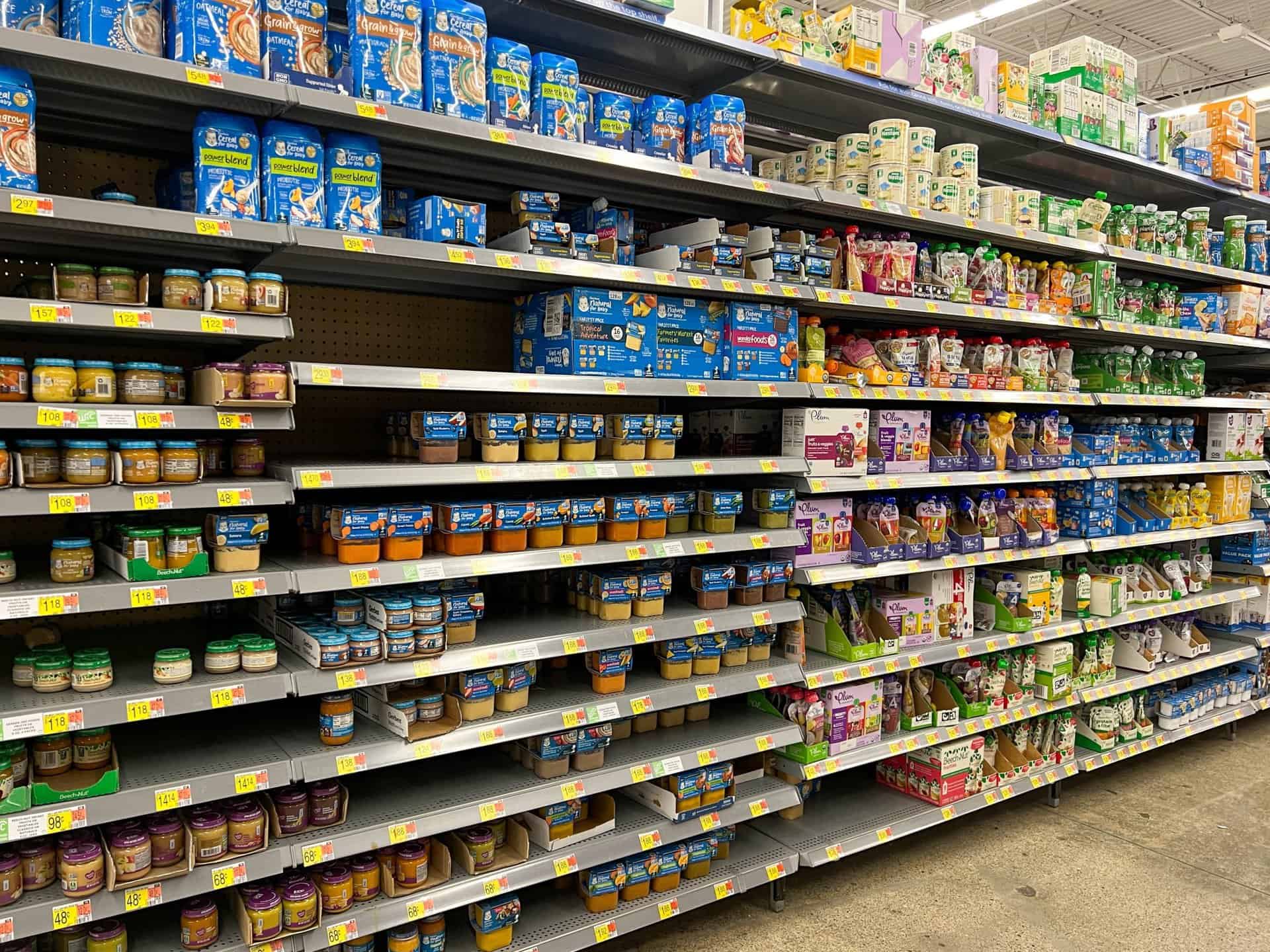Gerber Lawsuit Concerning Heavy Metals in Baby Food
- Last Updated: July 14th, 2025

Attorney Jessica Paluch-Hoerman, founder of TruLaw, has over 28 years of experience as a personal injury and mass tort attorney, and previously worked as an international tax attorney at Deloitte. Jessie collaborates with attorneys nationwide — enabling her to share reliable, up-to-date legal information with our readers.
Legally Reviewed
This article has been written and reviewed for legal accuracy and clarity by the team of writers and legal experts at TruLaw and is as accurate as possible. This content should not be taken as legal advice from an attorney. If you would like to learn more about our owner and experienced injury lawyer, Jessie Paluch, you can do so here.
Fact-Checked
TruLaw does everything possible to make sure the information in this article is up to date and accurate. If you need specific legal advice about your case, contact us by using the chat on the bottom of this page. This article should not be taken as advice from an attorney.
Key takeaways:
- Gerber baby food products have been found to contain dangerous levels of toxic heavy metals like arsenic, lead, cadmium, and mercury, which can lead to serious health risks in infants and toddlers, including neurodevelopmental disorders and long-term effects on organs and systems.
- Internal documents reveal that Gerber knew about the risks associated with heavy metal contamination in their baby food products but failed to adequately warn parents or take sufficient action to mitigate the dangers, leading to a class action lawsuit against the company.
- To join the Gerber baby food lawsuit, affected individuals must meet eligibility criteria, such as having purchased the products within a specified timeframe and providing evidence of health impacts on their children.
Overview of the Gerber Baby Food Lawsuit
On this page, we’ll discuss the Gerber lawsuit concerning heavy metals in baby food, health risks associated with toxic metal exposure, Gerber’s knowledge of toxic baby food contamination, and much more.
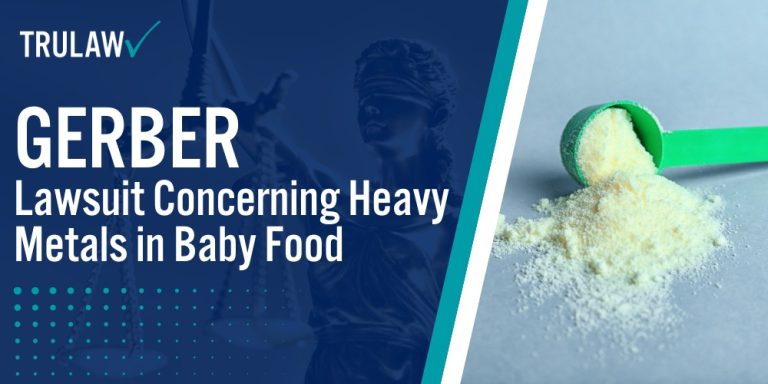
Intro to the Gerber Lawsuit
Key aspects of the Gerber lawsuit include, but are not limited to:
- Toxic Heavy Metals: Researchers have found that levels of arsenic, lead, cadmium, and mercury are in several Gerber baby food products.
- Neurodevelopmental Disorders: Exposure to these heavy metals has been linked to cognitive impairments, behavioral issues, and an increased risk of autism spectrum disorder (ASD).
- Gerber’s Knowledge: Internal documents reveal that Gerber was aware of the presence and risks of heavy metals in its products but failed to adequately warn parents.
- Legal Action: Multiple class action lawsuits have been filed against Gerber, alleging violations of safety standards and misleading labeling practices.
If your child has consumed Gerber baby food products and experienced developmental issues or health problems, you may be eligible to join the Gerber lawsuit.
Contact TruLaw today using the chat on this page to receive an instant case evaluation.
Table of Contents
Toxic Heavy Metals Found in Gerber Baby Foods
Researchers and legal analysts have found concerning levels of toxic heavy metals in several baby food products, including some from major baby food brands like Gerber.
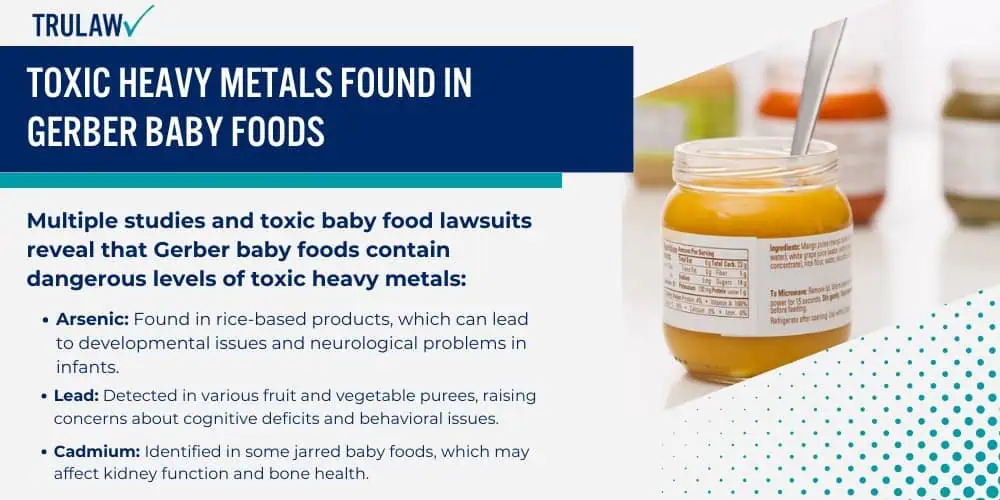
Elevated arsenic, lead, cadmium, and mercury levels pose potential health risks for infants and toddlers.
Dangerous Levels of Arsenic, Lead, Cadmium & Mercury
The presence of heavy metals in baby foods poses serious health risks to infants, as their developing bodies are highly vulnerable to toxic substances.
Parents are becoming increasingly concerned about the safety of the foods they feed their children, demanding greater transparency and stricter safety standards.
Multiple studies and toxic baby food lawsuits reveal that Gerber baby foods contain dangerous levels of toxic heavy metals:
- Arsenic: Found in rice-based products, which can lead to developmental issues and neurological problems in infants.
- Lead: Detected in various fruit and vegetable purees, raising concerns about cognitive deficits and behavioral issues.
- Cadmium: Identified in some jarred baby foods, which may affect kidney function and bone health.
- Mercury: Present in trace amounts, particularly in seafood-based products, potentially impacting brain development.
The presence of these metals in toxic baby foods has led to increased scrutiny and calls for stricter regulations.
Gerber’s Failure to Test for Heavy Metal Contamination
This lack of vigilance has heightened concerns among parents about the potential dangers lurking in everyday baby foods.
The company’s negligence has sparked widespread outrage and demands for accountability.
Gerber’s failure to consistently test their products for heavy metal contamination has been a focal point of recent public and legal scrutiny:
- Inconsistent Testing: Gerber did not routinely test for all four metals, leaving gaps in their safety protocols.
- Regulatory Gaps: Despite USDA and FDA guidelines, Gerber’s internal testing procedures often fell short of these standards.
- Consumer Trust: The lack of comprehensive testing undermined consumer confidence in the safety of Gerber products.
- Legal Repercussions: Due to these oversights, the company has faced autism baby food lawsuits, leading to more rigorous testing and transparency demands.
Gerber has exposed its products to potential contamination through these failures, prompting calls for better practices and standards.
Health Risks of Heavy Metals in Gerber Baby Food
Exposure to heavy metals in baby food has raised significant health concerns, particularly regarding its impact on neurodevelopment and long-term health outcomes in children.
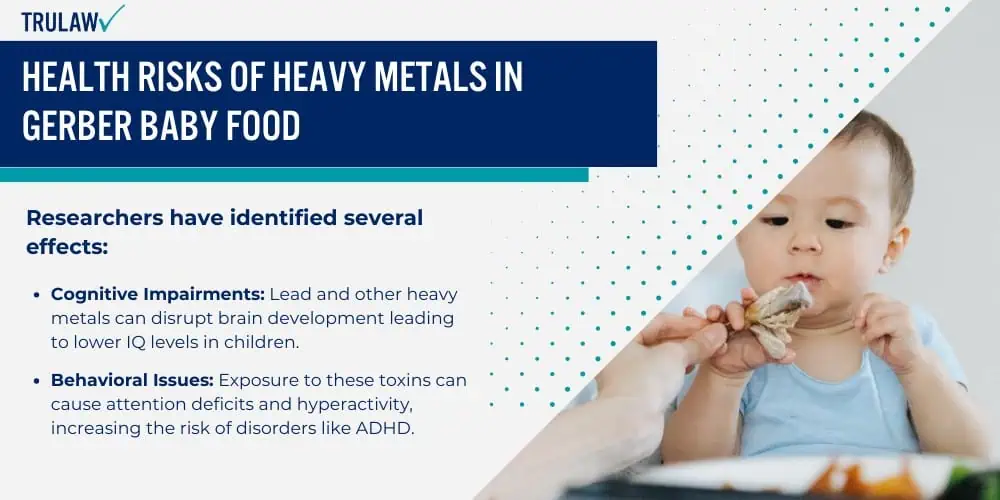
Specific risks associated with this exposure have led to legal action against baby food companies like Gerber.
Neurodevelopmental Disorders Linked to Gerber Lawsuit
Heavy metals such as arsenic, lead, cadmium, and mercury have been found in many popular baby foods.
The presence of these metals has been linked to neurodevelopmental disorders.
Researchers have identified several effects:
- Cognitive Impairments: Lead and other heavy metals can disrupt brain development leading to lower IQ levels in children.
- Behavioral Issues: Exposure to these toxins can cause attention deficits and hyperactivity, increasing the risk of disorders like ADHD.
- Autism Spectrum Disorder (ASD): Some studies suggest a link between heavy metal exposure and an increased prevalence of ASD, including cases mentioned in various baby food autism lawsuits.
- Delayed Motor Skills: Motor skill development can be impaired, causing difficulties in movement coordination.
The central concern is these metals’ impact on the developing brain, which is more vulnerable to toxic exposures.
Long-Term Effects of Toxic Metal Exposure on Children
Long-term exposure to heavy metals in baby food can lead to chronic health conditions.
The long-term effects include:
- Organ Damage: Continuous exposure can harm the liver and kidneys, which are essential for detoxifying the body.
- Immune System Suppression: Toxins like arsenic and lead can weaken the immune system, making children more susceptible to infections.
- Endocrine Disruption: Heavy metals can interfere with hormone production and regulation, affecting growth and development.
- Cancer Risk: Prolonged exposure to certain heavy metals, such as arsenic, is linked to an increased risk of various cancers.
- Cardiovascular Issues: Over time, heavy metals can contribute to hypertension and other heart-related problems.
Addressing the presence of these heavy metals in baby food is crucial to preventing these long-term health issues and effectively protecting children’s health.
Relevant policies and regulations are pivotal in mitigating these risks and ensuring safe products for consumers.
Gerber's Knowledge of Heavy Metal Contamination
Gerber’s internal documents and actions reveal significant awareness of the risks associated with heavy metal contamination in baby food.
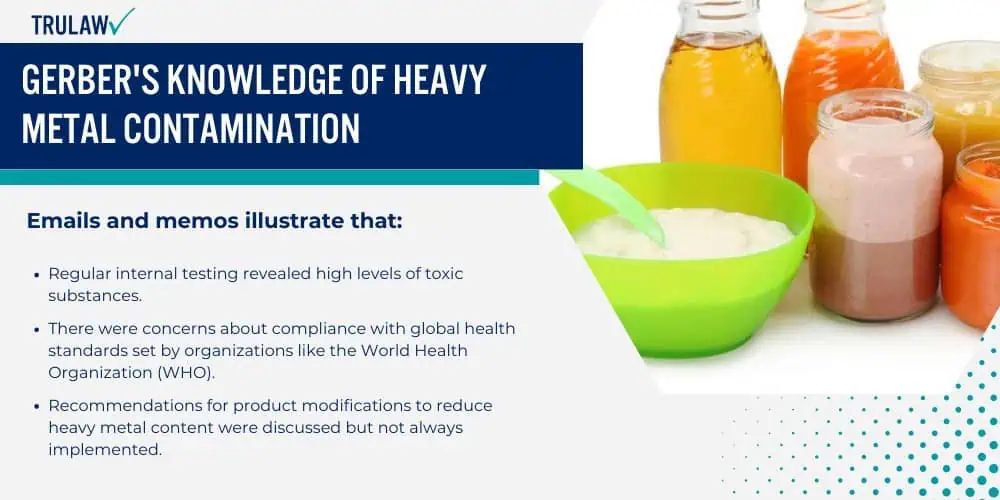
Despite this knowledge, Gerber repeatedly failed to warn parents about the potential dangers of these contaminants and the associated lawsuits.
Internal Documents Reveal Gerber Knew of Risks
Internal documents show Gerber had explicit knowledge of the presence and risks of heavy metals, including lead, arsenic, and cadmium, in their baby food products.
Emails and memos illustrate that:
- Regular internal testing revealed high levels of toxic substances.
- There were concerns about compliance with global health standards set by organizations like the World Health Organization (WHO).
- Recommendations for product modifications to reduce heavy metal content were discussed but not always implemented.
- Reports flagged potential legal and health repercussions if the contamination levels were made public.
This awareness underscores that Gerber actively monitored the issue but may have prioritized marketability over safety by not fully addressing the contamination problem.
Gerber Failed to Warn Parents About Lawsuit Concerns
Despite their internal awareness, Gerber did not adequately inform parents about the contamination or the class-action lawsuit risks.
Marketing materials continued to emphasize the safety and nutrition of their products without addressing the following:
- Ongoing litigation related to heavy metals in contaminated baby foods.
- Studies linking heavy metals to developmental issues in children.
- Differences between internal testing results and public statements regarding product safety.
- Regulatory feedback from health authorities highlighting non-compliance concerns.
- Lack of transparent communication on steps taken to mitigate these risks.
- Settlement talks and outcomes of the toxic baby food MDL that highlighted parental concerns.
This lack of transparency has eroded trust among consumers who rely on Gerber for children’s nutrition.
Government Reports on Gerber Baby Food Lawsuit
Government agencies and Congressional bodies have closely monitored the Gerber baby food lawsuit, which has provided important information on regulatory oversight and company practices.
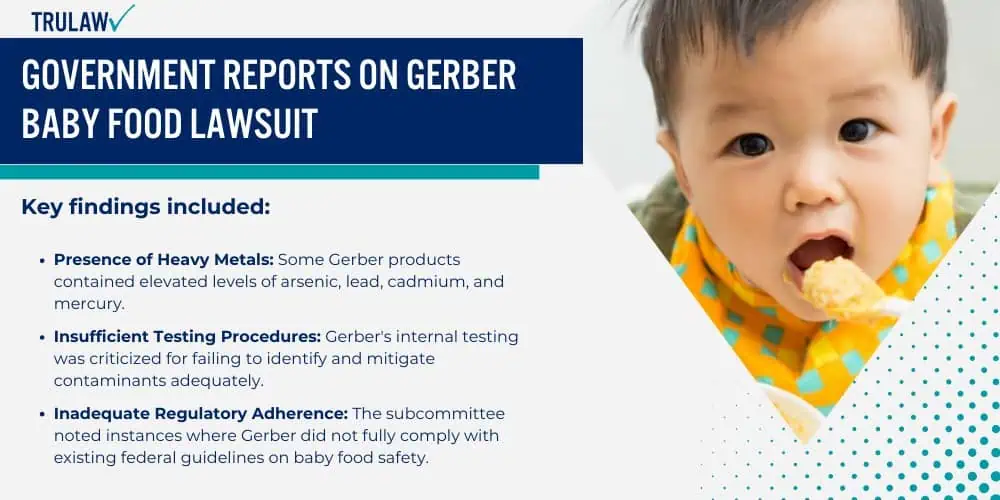
These insights include detailed findings from a House Subcommittee and relevant regulations from the FDA and EPA.
Congressional Subcommittee Findings on Gerber Lawsuit
The House Subcommittee Report on the Gerber baby food autism lawsuit revealed significant concerns regarding the presence of toxic substances in contaminated baby food products.
Key findings included:
- Presence of Heavy Metals: Some Gerber products contained elevated levels of arsenic, lead, cadmium, and mercury.
- Insufficient Testing Procedures: Gerber’s internal testing was criticized for failing to identify and mitigate contaminants adequately.
- Inadequate Regulatory Adherence: The subcommittee noted instances where Gerber did not fully comply with existing federal guidelines on baby food safety.
- Consumer Class Action Lawsuits: There has been a rise in class action suits filed by parents and advocacy groups demanding stricter safety protocols.
These findings highlight significant lapses in the company’s quality control processes and call for stronger enforcement of safety standards.
FDA & EPA Regulations Relevant to Gerber Lawsuit Case
The FDA and EPA Regulations have specific rules for the manufacturing and marketing of infant food products, which are relevant to the Gerber lawsuit.
Important regulatory points include:
- FDA Limits on Heavy Metals: The FDA has established permissible limits for heavy metals in food products, which Gerber allegedly violated, prompting federal court action.
- EPA Guidelines on Water Quality: To prevent contamination, water used in baby food production must meet certain EPA standards.
- Labeling Requirements: The FDA mandates accurate ingredient labeling to inform consumers, a key point in the federal case against Gerber.
- Compliance with Toxic Substances Control Act: Ensures that major baby food companies monitor and report the presence of hazardous substances to the EPA.
Compliance with these regulations is critical to ensuring the safety and transparency of baby food products, and deviations have significant legal and health implications.
Specific Gerber Baby Food Products Named in Lawsuit
Several Gerber baby food products have been singled out in the recent toxic baby food lawsuit due to allegations of contamination and misleading labeling.
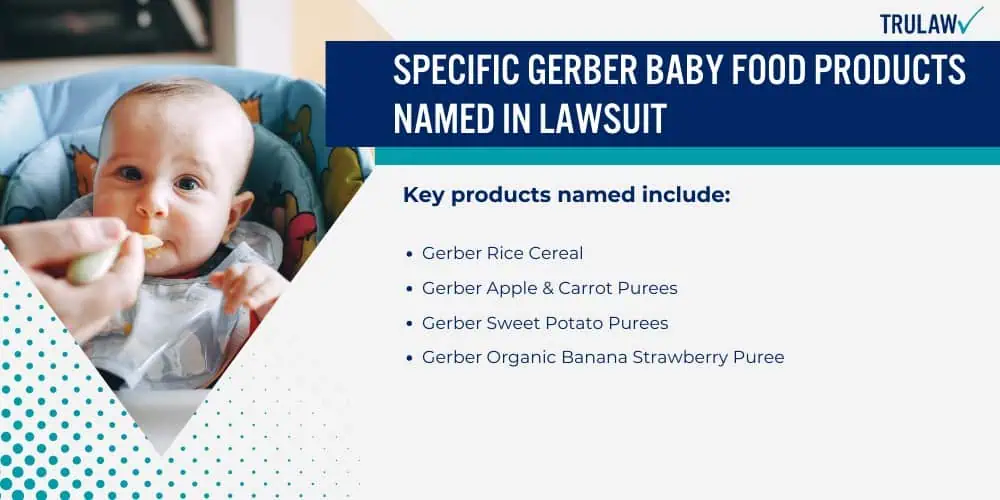
Independent tests have supported these claims, revealing concerning levels of contaminants in some products.
Gerber Rice Cereal & Other Foods Cited in Lawsuit
The lawsuit targets Gerber Rice Cereal and other food products, primarily for allegedly containing unsafe heavy metals such as arsenic, lead, and cadmium.
Key products named include:
- Gerber Rice Cereal
- Gerber Apple & Carrot Purees
- Gerber Sweet Potato Purees
- Gerber Organic Banana Strawberry Puree
The accusations highlight misleading labeling on these products, as they often claim to be safe and nutritious for infants.
The presence of these contaminants in baby sprout foods is particularly concerning, given their potential to affect development and health.
Independent Testing Confirms Gerber Lawsuit Claims
Independent testing: Several independent laboratories conducted tests confirming elevated levels of heavy metals in the targeted Gerber products.
These findings reinforced the allegations outlined in the lawsuit.
Primary findings indicate:
- High Arsenic Levels: Found in Gerber Rice Cereal.
- Lead Contamination: Detected in Gerber Apple & Carrot Purees.
- Cadmium Presence: Identified in Gerber Sweet Potato Purees.
- Over Permissible Limits: Content levels in some products exceeded FDA guidelines.
These results have drawn significant attention to food safety concerns in products meant for infants, raising questions about the adequacy of current regulations governing baby food manufacturers and specific baby food brands.
Status of Gerber Baby Food Lawsuit
The legal battle against Gerber highlights concerns surrounding heavy metals in baby food and involves a class action lawsuit.
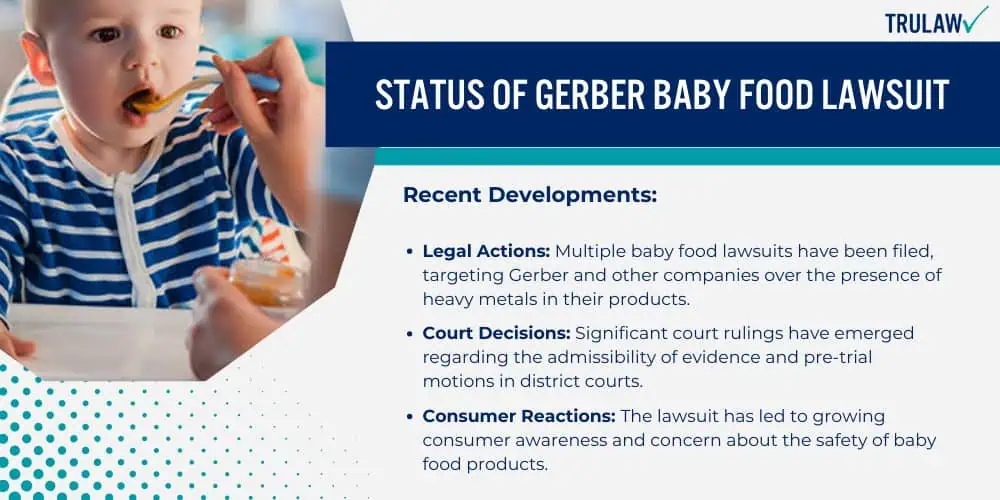
This section provides the latest updates and expected timelines for these legal proceedings.
Latest Updates on Gerber Heavy Metals Lawsuit
The lawsuit against Gerber has revealed disturbing findings about the presence of heavy metals in baby food, raising urgent questions about industry practices.
Parents and advocacy groups are intensifying their calls for stricter regulations and transparency as the case progresses.
Recent Developments:
- Legal Actions: Multiple baby food lawsuits have been filed, targeting Gerber and other companies over the presence of heavy metals in their products.
- Court Decisions: Significant court rulings have emerged regarding the admissibility of evidence and pre-trial motions in district courts.
- Consumer Reactions: The lawsuit has led to growing consumer awareness and concern about the safety of baby food products.
- Company Statements: Gerber has issued statements defending product safety and compliance with federal regulations.
Key Points:
- Federal Scrutiny: The FDA and other regulatory bodies closely monitor the case.
- Publicity: There has been extensive media coverage, adding pressure on Gerber.
- Expert Testimonies: Various experts are being called to testify about the potential health impacts of heavy metals in baby food.
Expected Timeline for Gerber Lawsuit Legal Proceedings
The timeline for the Gerber lawsuit is unfolding amidst growing public and legal scrutiny, reflecting the complexity and high stakes of the case.
Stakeholders keenly watch each development and anticipate potential outcomes.
Projected Stages:
- Pre-trial Activities: The initial stages have included evidence gathering, depositions, and preliminary hearings.
- Class Certification: One critical milestone will be the court’s decision on whether to certify the lawsuits as a class action.
- Trial Phase: If class certification is granted, the case could move to trial, where arguments will be presented.
- Settlement Discussions: Both parties may engage in settlement discussions to resolve the case without a lengthy trial.
Timeline Estimates:
- Initial Hearings: Early 2024 saw the first significant hearings.
- Class Action Decision: A decision on class action status is anticipated by late 2024.
- Trial Date: If no settlement is reached, a trial date could be set for mid-2025.
- Final Resolution: The entire legal process may continue into 2026, dependent on appeals and further court actions.
The status of the Gerber lawsuit remains dynamic as the legal proceedings continue to evolve.
How to Join the Gerber Baby Food Lawsuit
Joining the Gerber Baby Food Lawsuit involves understanding if you meet the eligibility requirements and following specific steps to file a claim.
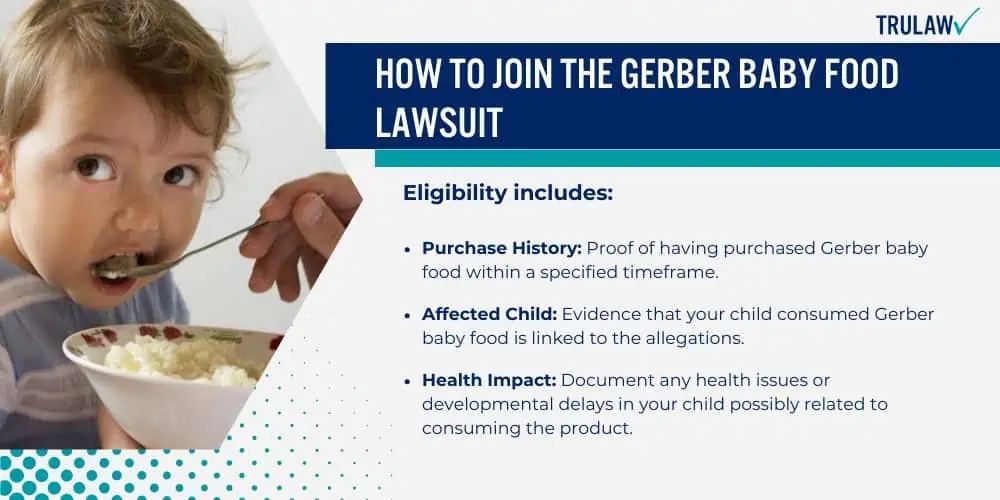
By engaging with experienced toxic baby food lawyers, you can ensure that your interests are represented effectively.
Eligibility Criteria for the Gerber Lawsuit
Individuals must meet certain criteria to participate in the Gerber Baby Food Lawsuit.
Eligibility includes:
- Purchase History: Proof of having purchased Gerber baby food within a specified timeframe.
- Affected Child: Evidence that your child consumed Gerber baby food is linked to the allegations.
- Health Impact: Document any health issues or developmental delays in your child possibly related to consuming the product.
- Legal Standing: Being a resident of a jurisdiction that recognizes the lawsuit.
Steps to Take for Filing a Gerber Baby Food Lawsuit
Filing a lawsuit against Gerber for toxic baby food contamination involves a systematic process to address your claim properly.
Following each step meticulously to strengthen your case and seek appropriate compensation is important.
To file a claim, follow these steps:
- Consultation with Lawyers: Contact toxic baby food lawyers to evaluate your case.
- Gather Documentation: Collect receipts, medical records, and other relevant documents.
- Join Class Action: If applicable, join the baby food class action. Your lawyer can assist with this process.
- File a Claim: Working with your lawyer, file the necessary paperwork to join the lawsuit officially.
- Stay Informed: Regularly communicate with your lawyer to stay updated on the progress of your case.
Choosing the Right Lawyer for Your Gerber Lawsuit
Selecting the ideal attorney for your Gerber lawsuit involves evaluating their experience and asking pertinent questions to ensure they fit your case well.
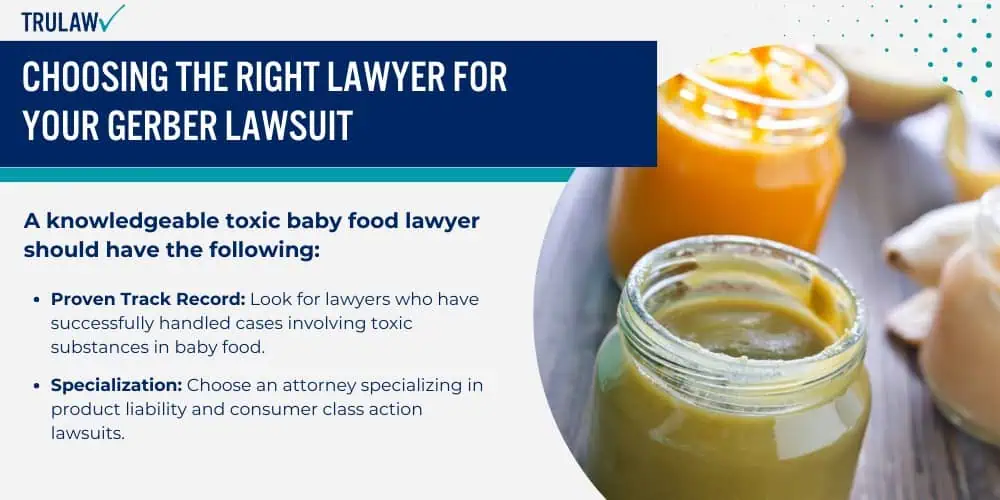
Pay attention to their background in similar cases and their communication ability.
What to Look for in a Gerber Lawsuit Attorney
When seeking a baby food lawyer for your Gerber lawsuit, prioritize experience in product liability lawsuits and consumer class action cases.
A knowledgeable toxic baby food lawyer should have the following:
- Proven Track Record: Look for lawyers who have successfully handled cases involving toxic substances in baby food.
- Specialization: Choose an attorney specializing in product liability and consumer class action lawsuits.
- Reputation: Research reviews and testimonials from past clients to assess the lawyer’s reliability and performance.
- Communication Skills: Ensure the lawyer explains legal terms clearly and communicates openly.
- Approach: A strategic and proactive approach in handling complex litigation.
These aspects will help you select a lawyer to manage your case effectively.
Questions to Ask Before Hiring a Gerber Lawsuit Lawyer
Before hiring a lawyer, asking detailed questions can help determine their suitability.
Add bold styling to keywords, related keywords, and lead-in sentences:
Here are some essential questions to ask:
- Experience: “Have you handled similar product liability lawsuits involving baby food?”
- Success Rate: “What is your success rate in consumer class action cases?”
- Resources: “Do you have the necessary resources and expertise to handle a case of this nature?”
- Fees and Costs: “What are your fees, and do you work on a contingency basis?”
- Strategy: “What is your approach to litigating cases against large corporations like Gerber?”
- Timeline: “How long do you anticipate the lawsuit will take?”
These questions will help you gauge the lawyer’s expertise, approach, and suitability for your Gerber lawsuit.
What to Expect in a Gerber Baby Food Lawsuit
Gerber baby food lawsuits typically involve claims related to the presence of harmful substances in their products.
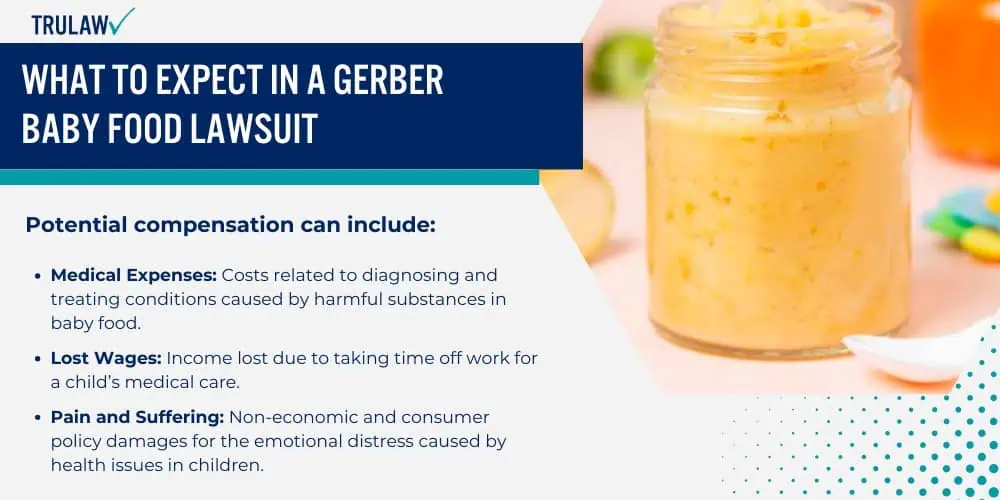
This section discusses potential compensation and the importance of these lawsuits.
Potential Compensation in Gerber Lawsuit Settlements
Victims of the Gerber lawsuit may be eligible for various types of compensation.
Potential compensation can include:
- Medical Expenses: Costs related to diagnosing and treating conditions caused by harmful substances in baby food.
- Lost Wages: Income lost due to taking time off work for a child’s medical care.
- Pain and Suffering: Non-economic and consumer policy damages for the emotional distress caused by health issues in children.
- Punitive Damages: Financial penalties aimed at punishing Gerber for its negligence.
- Legal Fees: Coverage the costs of pursuing the lawsuit, including attorney fees.
Compensation will vary depending on the specifics of each case, such as the severity of health impacts and the degree of negligence demonstrated.
Importance of Holding Gerber Accountable via Lawsuit
Holding Gerber accountable through legal action serves several vital purposes.
Important outcomes include:
- Consumer Safety: Ensuring that baby food is free from harmful substances and safe for infants.
- Corporate Responsibility: Pressuring large companies like Gerber to adhere to stricter safety standards.
- Public Awareness: Raising awareness about the potential risks of heavy metal contaminants in baby food.
- Regulatory Improvements: Encouraging regulatory bodies to enforce stricter guidelines for baby food manufacturers.
The toxic baby food cases and lawsuits alleging heavy metals in products highlight the need for industry vigilance and accountability.
Legal actions against Gerber can significantly improve product safety and corporate practices.
Toxic Baby Food Lawsuit Frequently Asked Questions
-
The Gerber baby food lawsuit alleges that several of the company’s products contain dangerous levels of toxic heavy metals such as arsenic, lead, cadmium, and mercury.
-
The lawsuit specifically targets Gerber Rice Cereal and other food products like Gerber Apple & Carrot Purees, Gerber Sweet Potato Purees, and Gerber Organic Banana Strawberry Puree.
-
Despite internal documents revealing Gerber’s knowledge of the presence and risks of heavy metals in their baby food products, the company failed to warn parents about the potential dangers adequately.
-
Exposure to heavy metals in baby food has been linked to several neurodevelopmental disorders, including cognitive impairments, behavioral issues, autism spectrum disorder (ASD), and delayed motor skills.
-
To join the Gerber baby food lawsuit, affected parents must meet certain eligibility criteria, such as providing proof of purchase and evidence of their child consuming the affected products.

Managing Attorney & Owner
With over 25 years of legal experience, Jessica Paluch-Hoerman is an Illinois lawyer, a CPA, and a mother of three. She spent the first decade of her career working as an international tax attorney at Deloitte.
In 2009, Jessie co-founded her own law firm with her husband – which has scaled to over 30 employees since its conception.
In 2016, Jessie founded TruLaw, which allows her to collaborate with attorneys and legal experts across the United States on a daily basis. This hypervaluable network of experts is what enables her to share the most reliable, accurate, and up-to-date legal information with our readers!
Additional Toxic Baby Food Lawsuit resources on our website:
Here, at TruLaw, we’re committed to helping victims get the justice they deserve.
Alongside our partner law firms, we have successfully collected over $3 Billion in verdicts and settlements on behalf of injured individuals.
Would you like our help?
At TruLaw, we fiercely combat corporations that endanger individuals’ well-being. If you’ve suffered injuries and believe these well-funded entities should be held accountable, we’re here for you.
With TruLaw, you gain access to successful and seasoned lawyers who maximize your chances of success. Our lawyers invest in you—they do not receive a dime until your lawsuit reaches a successful resolution!
AFFF Lawsuit claims are being filed against manufacturers of aqueous film-forming foam (AFFF), commonly used in firefighting.
Claims allege that companies such as 3M, DuPont, and Tyco Fire Products failed to adequately warn users about the potential dangers of AFFF exposure — including increased risks of various cancers and diseases.
Depo Provera Lawsuit claims are being filed by individuals who allege they developed meningioma (a type of brain tumor) after receiving Depo-Provera birth control injections.
A 2024 study found that women using Depo-Provera for at least 1 year are five times more likely to develop meningioma brain tumors compared to those not using the drug.
Suboxone Tooth Decay Lawsuit claims are being filed against Indivior, the manufacturer of Suboxone, a medication used to treat opioid addiction.
Claims allege that Indivior failed to adequately warn users about the potential dangers of severe tooth decay and dental injuries associated with Suboxone’s sublingual film version.
Social Media Harm Lawsuits are being filed against social media companies for allegedly causing mental health issues in children and teens.
Claims allege that companies like Meta, Google, ByteDance, and Snap designed addictive platforms that led to anxiety, depression, and other mental health issues without adequately warning users or parents.
Transvaginal Mesh Lawsuits are being filed against manufacturers of transvaginal mesh products used to treat pelvic organ prolapse (POP) and stress urinary incontinence (SUI).
Claims allege that companies like Ethicon, C.R. Bard, and Boston Scientific failed to adequately warn about potential dangers — including erosion, pain, and infection.
Bair Hugger Warming Blanket Lawsuits involve claims against 3M — alleging their surgical warming blankets caused severe infections and complications (particularly in hip and knee replacement surgeries).
Plaintiffs claim 3M failed to warn about potential risks — despite knowing about increased risk of deep joint infections since 2011.
Baby Formula NEC Lawsuit claims are being filed against manufacturers of cow’s milk-based baby formula products.
Claims allege that companies like Abbott Laboratories (Similac) and Mead Johnson & Company (Enfamil) failed to warn about the increased risk of necrotizing enterocolitis (NEC) in premature infants.
Here, at TruLaw, we’re committed to helping victims get the justice they deserve.
Alongside our partner law firms, we have successfully collected over $3 Billion in verdicts and settlements on behalf of injured individuals.
Would you like our help?
